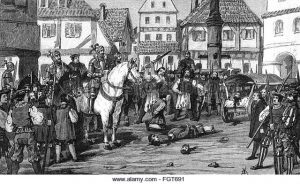Peasant Justice
The term “Peasant Justice” refers to a moral code that peasants, primarily
agricultural farmers living in the Middle Ages, wanted to achieve. Peasants sought
justice in terms of equality before God. They were critical of the luxury and vanity of
other nobles and priests who expected them to pay taxes, tolls, and duties and demand
other “peasant obligations.” In the Middle Ages, European peasants composed of the
lowest class, but these agricultural workers sought to fix the
world and religion in their own way, what historians call
“peasant justice.”
Peasants lived close to poverty and often faced periods of
famine. If they did not obey God, they would be punished with cold, hunger and death.
In this part, peasants justice was to obey God to avoid punishment.
Both festivals and folk humor displayed aspects of equality that peasants
dreamed of. Carnival is one example where peasants made fool of nobles and kings
with abandon. Peasants also had a strange “folk humor” that included “Real cuckolds
and scolding wives and wife-beating husband were forced to ride an ass with their faces
turned to the tail, their neighbors beating pots and pans” (Peasant Fires, page 24).
These are examples of how peasants saw a more justice society.
Because most peasants were illiterate and the Bible was written in Latin,
peasants could only listen to the priests’ words about religion. At that time, the church’s
 opinion was if a person wished to be solved and live in the ideal world after death, he
opinion was if a person wished to be solved and live in the ideal world after death, he
must stay in poverty and pay for his sins. However, at
the same time many local priests lost their morals and
began to take money from peasants. This is very
unfair to peasants because they just followed the church’s word and pray to God blindly
under the fear of punishment. “Then when they bray like donkeys in church, repeating
by rote the psalms they haven’t understood” ( Desiderius Erasmus: Praise of Folly,
1509). When peasants just listened to the priests without the truth, their justice was to
reform the religion back to pure.
Hans Behem, a peasant shepherder, was the leader of a peasant uprising. Hans
discovered the “unfair sense” of social inequality and supported Peasants Justice. He
believed that peasants had to know the truth about the real religion. As the spokesman
for the God, Hans had to speak with other authorities, such as emperor and pope, who
also claimed power that mandated from heaven to rule. The peasants rallied behind
Hans while he spoke against the Pope.As an example, there is a folktale about a boy named Hansel who is also finding
justice like Hans. Hansel has magical flutes which can make people sing and dance. His
stepmother wanted to punish him because he was a “devil”. On that day, Hansel found
his “justice;” he played the flute day and night. God promised nobody can hurt him
anymore. In this story, Hansel has the same justice as peasants. They hoped to live
without hostility which is their justice. However, Hans failed at that time and was caught
and fired.
Reference
The European Reformations Sourcebook. Edited by Carter Lindberg.(Oxford,2014)
Peasant Fires: The Drummer of Niklashausrn, by Richard Wunderli.(Indiana University
Press 1992)
Extra Links
Peasants’ war: https://www.britannica.com/event/Peasants-War
War of Peasants: http://www.newadvent.org/cathen/11597a.htm